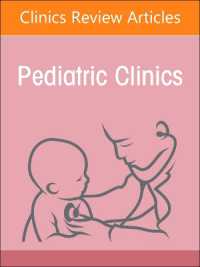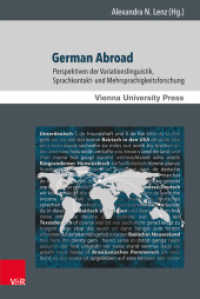- ホーム
- > 洋書
- > 英文書
- > Business / Economics
Full Description
The recent Covid-19 pandemic and recent economic and political turbulences exacerbate issues related to the economic and political resilience of countries. In this context, digitalization and productivity improvement, the development of the labour market and human capital, as well as regional disparities, and economic and social stratification, need special attention by policymakers and businesses. Adequate solutions to these issues will contribute to the enhancement of the competitiveness of Europe.
The chapters collected here examine the economic development, main experiences, lessons learned, and the challenges and perspectives ahead of the new member states of the EU to identify the determinants of imbalances in the economic development of these countries.
Contemporary Studies in Economic and Financial Analysis publishes a series of current and relevant themed volumes within the fields of economics and finance. Both disciplinary and interdisciplinary studies are welcome.
Contents
Chapter 1. Introduction - Navigating Economic Waters: Development and Resilience in EU Member States; Eleftherios Thalassinos
Chapter 2. Globalisation, Economic Integration, and Labour Market Dynamics within the European Union; Alina Ionașcu and Graţiela Georgiana Noja
Chapter 3. Does the Quality of Governance Have the Power to Attract Foreign Investors? Evidence from the EU-13 Member States; Tomasz Dorożyński, Anetta Kuna-Marszałek, and Bogusława Dobrowolska
Chapter 4. Regional Economic, Social, and Healthcare Disparities Among the European Union Member States; Małgorzata Stefania Lewandowska, Arkadiusz Michał Kowalski, Dawid Majcherek, and Scott William Hegerty
Chapter 5. An Empirical Assessment of the Impact of EU Digital Policies on Economic Growth; Maria Magdalena Doroiman and Nicoleta Sîrghi
Chapter 6. Productivity and Competitiveness: Future Challenges; Inna Šteinbuka, Oļegs Barānovs, Jānis Salmiņš, and Irina Skribāne
Chapter 7. International Trade. Single European Market; Margarita Dunska and Krišs Jānis Dombrovskis
Chapter 8. Financial Sector Development in New EU Member States; Marina Kudinska, Irina Solovjova, and Inna Romānova
Chapter 9. The Leading Industries in the New EU Member States and Their Contribution to Increasing the EU's Export Potential; Ileana Tache
Chapter 10. Managing Climate Change Risks and Environmental Challenges towards Sustainable Development within the European Union; Marilen-Gabriel Pirtea, Graţiela Georgiana Noja, Nicoleta-Claudia Moldovan, Irina-Maria Grecu, and Alexandra-Mădălina Țăran
Chapter 11. Quality of Life in the European Union; Kesra Nermend and Simon Grima
Chapter 12. Digitalisation and Productivity Improvement; Vida Davidaviciene and Alma Maciulyte-Sniukiene
Chapter 13. The Labour Market, Human Capital and Migration: Ageing and Stratification of Society; Biruta Sloka, Ilze Buligina, Ginta Tora, Juris Dzelme, Ilze Brante, Anna Angena, and Kristīne Liepiņa
Chapter 14. Future Challenges on the Way to the Full Convergence; Andrea Imperia and Loredana Mirra
Chapter 15. Higher Education Institutions' Responses to Digital Transformation within the European Union: Skills Development and Smart Specialisation; Grațiela Georgiana Noja, Cirpian Pânzaru, Mirela Cristea and Eleftherios Thalassinos
Chapter 16. Conclusions; Simon Grima, Inna Romānova, Grațiela Georgiana Noja and Tomasz Dorożyński








